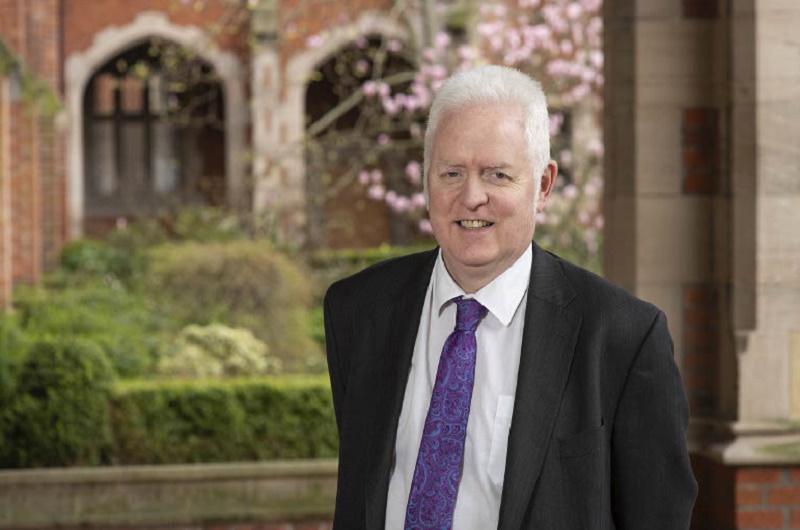Queen’s researchers’ vital work prompts removal of ban on treatment breaks for bowel cancer patients
Queen’s research has provided vital evidence that led NHS England to end a ban on ‘treatment breaks’ for advanced bowel cancer patients, allowing them a break from two drugs without the risk of having to pay thousands of pounds to continue treatment.

This is thanks to five years of determined campaigning from Bowel Cancer UK in partnership with patient, clinical and scientific communities. The work received the Impact of the Year Award from Health Data Research UK, the UK’s national institute for health data science.
The research, led by Queen’s University Belfast in collaboration with Bowel Cancer UK and a series of investigators across the UK was published in the Journal of Cancer Policy, the key policy journal for cancer.
The treatment break rule refers to NHS England’s policy imposed on the drugs cetuximab and panitumumab, which are used to treat advanced bowel cancer patients. Breaks are vital to have other forms of treatment like surgery and to improve a patient’s quality of life. Prolonged use of cetuximab and panitumumab can cause skin toxicities and serious side effects, such as extreme fatigue, changes to bowel habits, pustules containing pus and cystitis (bladder inflammation).
Using health economic modelling and analysis, the researchers found that employing a treatment break approach would not have any negative impact on a patient’s quality-of-life and outcome but could help save up to £1.2 billion for NHS England. This work formed part of the crucial evidence that Bowel Cancer UK presented to NHS England to justify the change in bowel cancer treatment policy.
Annually, nearly 43,000 new bowel cancer cases occur in the UK, making it the fourth most common cancer and second leading cause of cancer death, with more than 16,500 patients dying of the disease.
Professor Mark Lawler, Professor of Digital Health at Queen’s, Scientific Director of DATA-CAN, the UK’s Health Data Research Hub for Cancer, co-lead of HDR UK’s new Big Data for Complex Disease Research Driver Programme and senior author on the study said: “As we celebrate the 75th anniversary of the National Health Service, the decision by NHS England to end their ban on treatment breaks represents a long overdue victory for cancer patients. It shows how turning data into evidence is critical to influencing a change in NHS policy that directly benefits our patients.
“I am delighted that this work also received the HDR UK Impact of the Year Award, as it shows emphatically the important role that data can play in enhancing human health. Data truly can save lives and enhance the quality of life for cancer patients. The only pity is that is taken five years to achieve this victory.”
Dr Raymond Henderson, Senior Health Technology Assessment Manager at Salutem Insights Ltd and lead author on the paper, said: “Allowing patients to avail of treatment breaks not only can provide good value but also can enhance their quality of life and outcome.”
Professor Declan French, Professor of Finance at the Queen’s Management School and a co-author on the paper, added: “This work emphasises the importance of capturing and deploying health economic data in treatment decision making. Having an evidence base to underpin policy change in cancer is crucial.”
Jane Ashford, who has long campaigned with Bowel Cancer UK for this rule change, says: “I am absolutely delighted to hear that NHS England have finally dropped their treatment break rule after many years of campaigning. During my treatment, I was not able to have a break due to the funding rules and there was a constant fear of the treatment being taken away from me.
“My oncologist was keen for me to have a break, as the toxicity of the drugs was leading to serious health issues. However, I had no choice but to continue with no breaks under the arbitrary rule. I had to leave my job as an NHS Lead Nurse Specialist because of the physical, emotional and psychological side effects from long term use of the treatment. This had a huge impact on the quality of my life. This amazing news means this rule change for people with advanced bowel cancer can stop living in fear of losing funding for their treatment. They will be able to plan breaks, holidays and return to work. Importantly, our oncologists will now be able to deliver a personalised treatment approach which is a huge breakthrough.”
Speaking about the decision, Genevieve Edwards, Chief Executive at Bowel Cancer UK, said: “I am delighted to be highlighting this victory for cancer patients. We're extremely pleased to see NHS England drop their treatment break rule for cetuximab and panitumumab. For five years, we've been campaigning with patients, their families, clinicians and scientists, to allow patients to take a break from treatment without losing their access to these vital drugs.
“Patients with advanced bowel cancer have very few treatment options and these drugs are often their only lifeline. This decision by NHS England will bring new hope for advanced bowel cancer patients to have a better quality of life, spend more time with loved ones and, for some, even the chance of full remission and return to a normal life.”
Professor Lawler added: “This study is the first of its kind to use a cost minimization approach to look at the real costs of cancer therapies and their impact. It highlights how substantial cost savings can be achieved by reducing treatment, quality of life maintained, while reinforcing the importance of therapy breaks to potentially increase tumour responsiveness to treatment once the therapy is reintroduced.”
Featured Expert

Media
Media inquiries to Sian Devlin at s.devlin@qub.ac.uk